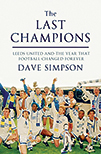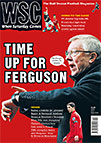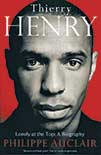 Leeds United and the year that football changed forever
Leeds United and the year that football changed forever
by Dave Simpson
Bantam Press, £16.99
Reviewed by Simon Creasey
From WSC 305 July 2012
Buy this book
Twenty years ago a ragtag bunch of journeymen footballers, raw youngsters, non-League players plucked from obscurity and a mercurial Frenchman achieved the seemingly impossible. Assembled for just £8 million, the 1991-92 Leeds United team created by Howard Wilkinson became the last side to win the old Division One title. The following season the Premier League was born.
What this team achieved in a short space of time was unprecedented. In just three and a half seasons, following almost a decade in the wilderness, Wilkinson transformed a relegation-threatened second-level side into League winners. The sheer size of the achievement has finally been given the recognition it deserves in The Last Champions.
Author Dave Simpson tracked down members of the title-winning side to find out what it was like in the inner sanctum of the club during this momentous period. Featuring interviews with former players including Lee Chapman, Tony Dorigo and a touching chat with Gary Speed shortly before his untimely death, Simpson pieces together what made this team such a cohesive, well oiled machine.
The book starts by revealing that Wilkinson pioneered many of the sports science techniques common in today’s game. From the dietary advice and special vitamin drinks he prescribed, through to the extreme, military-style fitness regime that earned him the “Sergeant” moniker, Wilkinson was acutely aware that physical conditioning could make up for a shortfall in technical ability.
It also charts Wilkinson’s sometimes suspect man-management skills and his ability to cut players loose without seeming to give any thought to their feelings. Among many others, Vinnie Jones and Chris Kamara were ruthlessly released when Wilkinson decided they had served their purpose by helping the club return to the top flight.
The interviewees provide plenty of eye-opening stories about former team-mates. While Simpson failed to make contact with the reclusive David Batty, who turned his back on the game after retiring, there are plenty of colourful anecdotes about the midfielder. Such as the time an inebriated Jones took his car for a spin – with some “birds” in tow – around Batty’s front lawn before breaking into the house to frighten his team-mate, only to find Batty wielding a Bowie knife that he hid in his bed.
Amid the usual revelations that are common to all contemporary football biographies, Simpson’s story captures the pathos of the many players who narrowly missed out on the Premier League cash cow. While some leading lights from the squad forged lucrative post-retirement careers, such as Eric Cantona, Jones and Kamara, many of the title winners are still holding down ordinary jobs to pay the bills. Former striker Carl Shutt works as a travel agent and towering centre-half John McClelland provides regular tours of Elland Road when not working as a postman. McClelland best sums up the sheer magnitude of the team’s achievement, which he likens to “climbing Everest”. To put it into context, imagine Southampton winning the Premier League title in 2013-14. That is what Wilkinson and his players achieved and it is what makes this story so special and worthy of Simpson’s insightful homage.
Buy this book
 Seb Patrick mantains that it is becoming harder to admire or support a player who has lots of skill but repeatedly damages his club’s image
Seb Patrick mantains that it is becoming harder to admire or support a player who has lots of skill but repeatedly damages his club’s image Lonely at the top:
A biography
Lonely at the top:
A biography Leeds United and the year that football changed forever
Leeds United and the year that football changed forever
